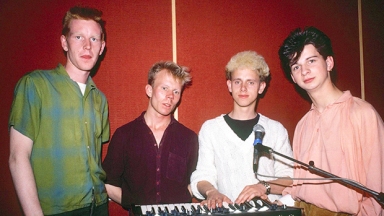
View gallery
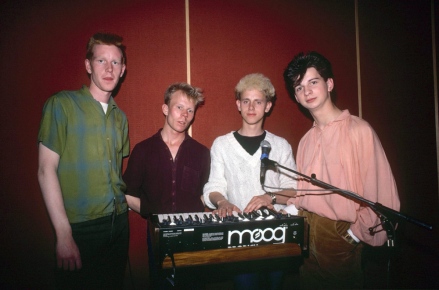
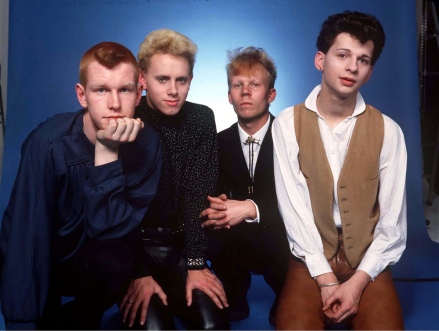
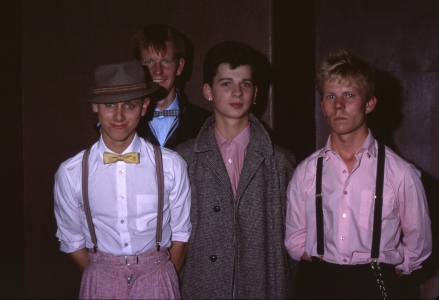
Image Credit: Ilpo Musto/Shutterstock
- Depeche Mode is a band that formed in 1980.
- Their song, “Never Let Me Down Again,” was used in The Last Of Us.
- Here are 12 more songs to check out.
2023 may well be the year of Depeche Mode. In March, the band – Dave Gahan and Martin Gore – will release Memento Mori, its fifteenth album, the first since the passing of founding member Andy Fletcher</strong>. The band will perform live for the first time in five years, kicking off a worldwide tour. They may have a new generation of fans, thanks to The Last Of Us.
In the debut episode of the HBO live-action adaptation of the hit video game, showrunner Craig Mazin utilized the group’s “Never Let Me Down Again” in a closing scene. “My wife has an encyclopedic knowledge of 1980s music,” he told The Hollywood Reporter. “And I literally said all the things you just said. I need it to be a song that I kind of know but I haven’t heard in a long time. One that hasn’t been beaten to death. And I needed it to have context. I needed to be meaningful. I needed [it] to be foreboding, and ideally, without being super on the nose, give me a comment …. And then she was like: ‘Never Let Me Down Again.’ And I’m like, ‘Oh, my God.’”
Whether The Last Of Us causes a Kate Bush-style surge in streams remains to be seen. For those fans hearing Depeche Mode for the first time (or are now doing a deep-dive), here are some songs to help you get acquainted with these electronic goth rock gods.
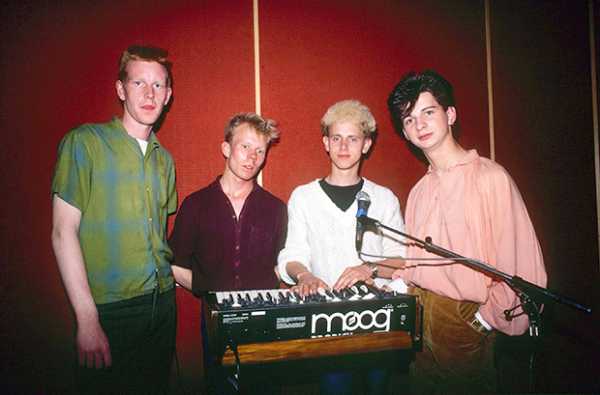
Depeche Mode as they were just starting out (Ilpo Musto/Shutterstock)
“Just Can’t Get Enough”
Compared to the rest of Depeche Mode’s body of work, “Just Can’t Get Enough” stands out. Like the awkward middle-school photo that haunts the now cool high school senior, “Just Can’t Get Enough” sees the band in a very different sound than they’d later employ on hits like “Personal Jesus,” “Never Let Me Down Again,” and “Barrel of a Gun.”
“I was maybe 18, almost 19,” Dave Gahan told Entertainment Weekly in 2017. “The punk thing had just kind of ended, but there were still a few people who were hanging out in the clubs in London, who were trying to play music that you could dance to a bit more that wasn’t so violent, and ‘Just Can’t Get Enough’ became one of those.”
Written by founding member Vince Clarke, “Just Can’t Get Enough” was not the sound he was normally into. He wasn’t into dance music until he heard “To Cut A Long Story Short” by Spandau Ballet. “It was the first time I was actually impressed by a rhythm that went ‘boom-thwack, boom-thwack,’” he told Rolling Stone in 2000, per Songfacts. “It was the first time I discovered dance music for myself, and to write a song around the rhythm was quite a revelation for me. ‘Just Can’t Get Enough’ came out of that.”
Clarke left Depeche Mode shortly after the release of Speak & Spell to form Yazoo/Yaz and Erasure. “[Speak & Spell] was very much a Vince Clarke album, and he owns the rights to that song, of course, so it’s been in so many commercials, and it pops up,” Gahan told EW. “I think that song has kept him in cornflakes for many years.”
“Everything Counts”
Clarke exited Depeche Mode because he claimed he was sick of touring. “That’s what he said, but I think that’s a lot of bullsh**, to be quite honest,” Gahan told Rolling Stone in 1990. “I think he’d just taken it as far as he could.”
“We were very successful. We were in every pop magazine. We were on the TV shows. Everything was going right for Depeche Mode. Everybody wanted to know about Depeche Mode. I think Vince suddenly lost interest in it – and he started getting letters from fans asking what kind of socks he wore,” said Gahan. “Martin had written a couple of songs, and we went into the studio and recorded ‘See You,’ which was our biggest hit so far. So that was it ‘Bye, Vince.’”
“See You” would climb higher than “Just Can’t Get Enough,” reaching No. 6 on the UK Singles Chart. However, it didn’t sell as well as its predecessor. And the subsequent singles – “The Meaning of Love” and “Leave In Silence” from 1982’s A Broken Frame – had diminishing returns. With the band seemingly on the verge of collapse, Gore shifted gears, turning away from the effervescent world of pop to adopt more political themes on 1983’s Construction Time Again. This is best exemplified in “Everything Counts.”
“‘Everything Counts’ is the kind of course-correcting, game-changing record that few bands with mainstream aspirations allow themselves to make (or are allowed to make),” wrote Jason Heller for The AV Club in 2011. “It’s gutsy. It’s subversive. It’s weird. Yet it formed the template for everything Depeche Mode would achieve over the next ten years, when Gore and crew morphed from second-stringers to stadium-fillers.”
“People Are People”
Though Depeche Mode had enjoyed success in the UK, the band hadn’t crossed over into other countries – especially the United States – until 1984’s “People Are People.” The song reached No. 4 on the UK Singles Charts, the band’s best showing up to that point, and No. 13 on the Billboard Hot 100. “People Are People” showed that the band could have widespread appeal, and its success would allow the group some financial breathing room. 0
“This was the first song of ours that made a dent, really, into popular radio,” Gahan told EW. “It’s not one of Martin’s particular favorites, this one, and I don’t think we’ve done it live since the mid ’80s. It’s quite literal, very poppy, all major cords — something Martin doesn’t like so much these days. But the song really propelled us into a new cosmos at that particular time.”
Despite Gahan’s calling the song “very poppy,” its lyrics are heavy (“a political song wrapped in pop’s clothing,” writes Clash magazine). The BBC reports that “People Are People” was used as the theme of West German TV’s coverage of the 1984 Olympics (when East Germany joined a Soviet Union-led boycott in retaliation to the American-led boycott of the 1980 Olympics.)
“The song became a no. 1 hit in many countries in Europe,” said Gahan, “and it allowed us to then go off and create the music that we wanted to create.”
“Master And Servant”
As Depeche Mode progressed through the 1980s, the band’s sound fell further away from the pop joy that surrounded the group’s first success. While writing about BDSM wasn’t unusual for a synthpop band (Soft Cell had “Sex Dwarf” on their 1981 album, Nonstop Erotic Cabaret), this still stands as a pivotal moment for Depeche Mode, especially in its growing appeal with the goth/Batcave Club community.
“Even more of an industrial anthem than its predecessors, ‘Master and Servant’ doesn’t merely codify the implicit bondage/domination doings of said perceived scene in its lyrics but brings them to total life via the powerful rhythm attack,” writes AllMusic. “That it could also be a pop hit is part of Depeche Mode’s unique, powerful appeal, from the opening call-and-response vocals to David Gahan’s heavily treated vocals and the combination of softer tones and harsher screams, noises, and drumming.”
The song reflects Martin’s shifting interests. He’d become “acquainted with the music of industrial acts such as Einstürzende Neubauten and SPK,” writes AJ Ramirez for Pop Matters. “However, instead of creating confrontational musique concrete like many of his inspirations, Gore was adamant about fashioning his new influences into a pop context.” This is why “Master and Servant” matters: Gore took his peers’ and idols’ experimentation and presented it as a palatable sound for the masses without sacrificing the bulk of the grit, grime, and underground excitement.
“Shake The Disease”
“The song tells the story of a one-sided relationship between a girl and a boy. They realize that it is as good as over for them. So it’s a poignant song, but not real life,” Martin reportedly said in 1985, per the DM/Live fan-site.
“It’s basically a love song, and it’s really about the problems of not being able to get across what you really mean,” Gahan reportedly said in an appearance on the ITV television show No. 73, “When you’re actually trying to talk to someone that you, let’s say, fancy — you know, you fancy someone at school or whatever and you’re trying to talk to them. Sometimes it’s very difficult, you know, and that’s what it’s basically about. And he’s trying to shake that disease of not being able to talk to people.”
“Strangelove”
Released as the lead single from Music for the Masses, “Strangelove” acts like a perfect balancing act between Depeche Mode’s pop-leanings that helped spark the band’s creation and the dark, sultry attitudes that lurked under the surface.
“‘Strangelove’ slipped out as an early single while [Music For The Masses] sessions were still ongoing; as first heard, it was aggressive synth-funk that was almost…sprightly,” wrote Ned Raggett for The Quietus. This almost-accidental single “helped set the overall tone of things to come, with the [Anton] Corbijn video fully showcasing the director’s eye for odd, intriguing visuals shot through with humor and barely concealed lust.”
Though the band was cute – the earlier videos and photos showed them as crisp, clean young lads – this was when the group began to get sexy. While they weren’t entirely there yet (the image of Gahan, Gore, Fletcher, and Wilder lip-syncing to the song in identical shades seems absurd in hindsight), they were on their way.
“Behind The Wheel”
Similar to “Strangelove” and the “Never Let Me Down Again,” “Behind The Wheel” – also from Music For The Masses – helped Depeche Mode grow from synthpop idols into dark heartthrobs of the underground.
As a pule-pounding beat drives “Behind the Wheel,” Gahan’s confidence surges as he serenades the female driver with his sultry, captivating voice. Yet, there seems something dark and forbidden about this song, as if it were touching back on the themes posed in “Master and Servant” three years earlier.
“Depeche Mode built a diehard cult, becoming one of the essential goth/industrial bands to cross over into the mainstream,” wrote the Rock & Roll Hall of Fame when the band was inducted in 2020. “Known for their dark, industrial love songs for the modern era, Depeche Mode have earned a massive following by pushing sonic and lyrical boundaries with new synthesizer technology and captivating live performances. They continue to evolve, remaining a legendarily fearsome live act across the planet, with one foot in the underground and the other in the club – but always with an eye on the future.
“Never Let Me Down Again”
Released as the second single from 1987’s Music for the Masses, “Never Let Me Down Again” reached No. 63 on the US Billboard Hot 100 charts and tapped out at No. 22 on the UK Singles Chart. The song was thrust back into the spotlight in 2023 when HBO’s The Last Of Us, the live-action adaptation of the hit video game series, used the song in its debut episode.
Written by Martin Gore, the song was produced by David Bascombe, who worked with the band on Music For The Masses. “‘Never Let Me Down Again’ was the one I was really, really pleased with,” noted Bascombe in a making-of documentary, per Music Radar. “I was really involved with the drum sounds on that. The guitar intro was actually an accident because [with] the sequencers we were using in those days, that guitar was sampled, and it just ran on the count-in over the start of the track, but it wasn’t supposed to be. We all went, ‘That’s great,’ and so that was a happy accident.”
The song marks an increase of guitar sounds in the Depeche Mode sound, something that would be seen in the band’s next album, Violator.
“Personal Jesus”
The song was inspired by Priscilla Presley’s memoir, Elvis & Me, in which she describes the King as her own “personal Jesus.” Martin took that one step further. “It’s about how Elvis was her man and her mentor and how often that happens in love relationships; how everybody’s heart is like a god in some way,” Martin told Spin in 1990. “We play these god-like parts for people, but no one is perfect, and that’s not a very balanced view of someone, is it?”
“It’s a great line!” Gahan told EW. “It’s got a humor in it too as well, and there’s always this weird dark humor within a lot of Depeche Mode songs that people miss, tongue-in-cheek and also very British, but it was in that song for sure.”
“Enjoy The Silence”
“Enjoy The Silence” is, as of Jan. 2023, Depeche Mode’s most successful song. Though it only reached No. 6 in the UK Singles chart, it broke through the Top 10 of the Billboard Hot 100, reaching No. 8. The UK certified it Platinum, and it went Gold in the states. The song “made Depeche Mode into American superstars, propelling their seventh album, Violator, to triple-platinum status and prompting a near-riot at a SoCal in-store appearance,” writes Rolling Stone when listing it at No. 415 of its 500 Best Songs Of All Time list.
“When Martin first came up with a demo for ‘Silence,’ it was kind of half a song. Just a piano and these very slow, ballad-y couple of verses,” Gahan shared with EW. “And Alan [Wilder] and Flood, who was producing the album, had this idea to put a beat to it. They said, ‘Get out of the studio and come back in two days.’… We literally recorded it in a couple of days. Then we started messing with the song, trying to make it more than it was, and it never needed more. We put it out like that, and I think we knew between us that there was something very special about it, but we had no idea what a huge hit it was going to be.”
“Policy Of Truth”
“Personal Jesus,” “Enjoy The Silence,” and “Policy of Truth” mark the three major U.S. hits off of Violator. While Depeche Mode would also release “World In My Eyes” (and it would reach No. 17 on the UK Singles Chart), it failed to crack the top half of the Billboard Hot 100, whereas “Policy of Truth” made it to No. 15.
The song “glides along on one of the band’s most alluring synthetic rhythms,” wrote Jim Beviglia for American Songwriter. “Gore’s words, which are transmitted by Gahan in his insinuating tones, waste no time in making their point: ‘You had something to hide/Should have hidden it, shouldn’t you?’”
“What really drove me was, first of all, to prove to you and everybody else that we were a force to be reckoned with,” Gahan says of that time, per American Songwriter. “That we were important and had just as much right to be here as your U2s or whoever were the critics darlings at the time. I think we always felt we were somehow slighted in that way. When we were making Violator, even though we had no idea what the success of that album was going to be after we released it, there was definitely a feeling of breaking new ground.”
“I Feel You”
Released as the first single from Songs of Faith and Devotion, “I Feel You” showcased Depeche Mode’s range by reaching No. 1 on the US Modern Rock Tracks and No. 3 on the Hot Dance Club Play charts. Not many bands can accomplish such a feat, and it’s why Depeche Mode has resonated with so many throughout its forty-year career.
“Electronically generated post-Goth dance pop isn’t a concept, it’s a style,” wrote Rolling Stone in its review of the album in 1993. “Song to song, Faith and Devotion showcases Depeche’s every, er, mode at its finest and adds a wee something — an intensifier, a surprise, the shocking but not unpleasant sound of frontman Dave Gahan actually singing. ‘I Feel You’ has the twangy stomp of “Personal Jesus”; it’s ecstatically danceable.”
And people have been dancing ever since.
Click to Subscribe to Get Our Free HollywoodLife Daily Newsletter to get the hottest celeb news. View Related Gallery
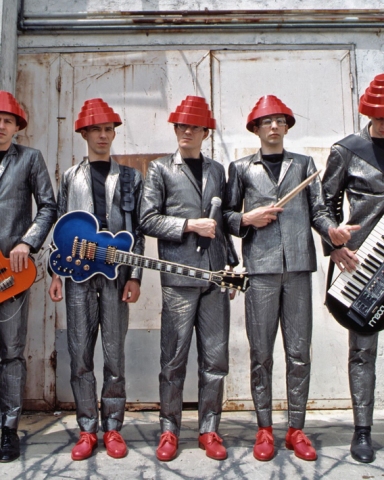
If you’ve got an uncontrollable urge because of the girl you want (or you’re struggling with too many paranoias from your freedom of choice in this beautiful world) then you have one question to ask yourself: are you not men? You. Are. Devo. DEVO – the group that rose to prominence with brothers Mark Mothersbaugh and Bob Mothersbaugh, Gerald Casale and Bob Casale, and Alan Myers – remain one of the most iconic and influential bands of all time. Born out of the Kent State massacre in Ohio, the art collective began combating the degradation of thoughts and culture, the “de-evolution,” with their music and visual style. The group arrived as the punk and new wave movement in music was starting to gain traction, providing DEVO with a fertile ground to grow their legion of fans. When MTV began, DEVO was there with videos for “Satisfaction,” “Freedom of Choice,” “Beautiful World,” and “Whip It” – the song that many know the group for. In the decades since the band formed, the members have continued to pursue music, art, and expression, with Gerald Casale forming his own winery and musical side projects, and Mark Mothersbaugh – with help from his DEVO compatriots – forming Mutato Muzika, and scoring everything from ‘Rugrats’ to ‘Thor: Ragnarok.’
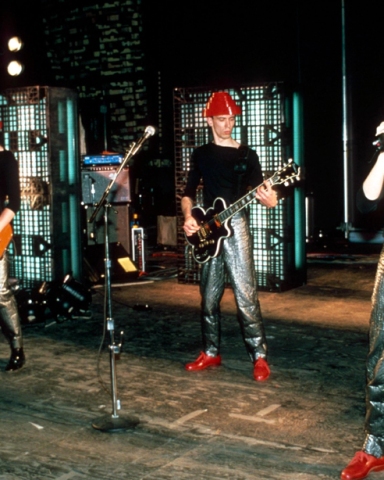
DEVO Devo – 1980
Sourse: hollywoodlife.com







